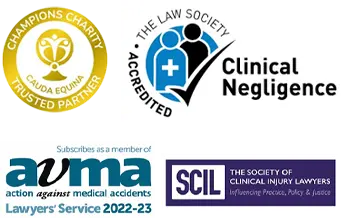
Subarachnoid Haemorrhages
Every year, around 8,000 people in the UK will suffer a subarachnoid haemorrhage. As a medical condition which arises suddenly and without warning, there is often nothing that can be done to remedy the problem. However, there are occasionally times when complications occur because a medical professional fails to make an accurate diagnosis. This could in turn amount to medical negligence.
What is a Subarachnoid Haemorrhage?
A subarachnoid haemorrhage is when blood leaks onto the surface of the brain, which in turn causes a rare type of stroke. Around 75% of subarachnoid haemorrhages can be attributed to an aneurysm, whereby a blood vessel ruptures due to a weakness in the blood vessel wall. This can happen to anyone, although the risk is increased if someone smokes, drinks excessive amounts of alcohol or has high blood pressure.
When someone suffers a subarachnoid haemorrhage, he/she will often experience a sudden, intense headache followed by vomiting and a stiff neck. Symptoms are, therefore, not dissimilar to those of meningitis. Some may also collapse, have a seizure or lose consciousness. When this happens, it is vital to seek medical treatment without delay. This is because the leakage of blood will damage the brain tissue, while the absence of oxygen may also lead to further brain injury. Thus a subarachnoid haemorrhage must be treated as a medical emergency.
Diagnosing a Subarachnoid Haemorrhage
When a patient is taken to hospital with symptoms of a subarachnoid haemorrhage, it is essential a diagnosis is made as soon as possible. This is because subarachnoid haemorrhages are extremely serious, and any delay in treatment will cause a patient's chance of recovery to rapidly diminish.
A doctor should be able to make initial diagnosis of a subarachnoid haemorrhage by noting the symptoms alone. Afterwards a patient should be sent for urgent tests, such as a CT scan, an MRI scan, a lumbar puncture or a Doppler ultrasound. The results will then confirm whether or not there is blood on the brain, and will also help to determine the best possible course of treatment. This may include surgical clipping, medication or endovascular coiling.
A Delay in Diagnosis and Medical Negligence
Sadly, around 10-15% of subarachnoid haemorrhage patients will die before they even reach hospital, while 50% will die within 30 days of the haemorrhage itself. However, a patient's prospects are greatly improved if treatment is given in a prompt fashion, particularly if such treatment is given in a specialist neurosurgical unit.
Thus a patient is dependent upon medical professionals identifying the condition quickly and efficiently. If there is a delay in diagnosis (and therefore a delay in treatment), a patient's welfare will be put at risk. It is likely this will lead to long-term complications or even death.
If you or someone close to you has suffered because a subarachnoid haemorrhage was not diagnosed, you may wonder whether the treatment provided fell below an acceptable standard. If so, then you have been the victim of medical negligence, and you could be entitled to receive compensation for the pain and suffering caused. To find out more, you need to speak to a medical negligence solicitor.
Can We Help You With A Medical Negligence Enquiry?
Early legal assistance can be vital so please contact us if you would like to discuss your situation. Please call us free on 0800 234 3300 (or from a mobile 01275 334030) or complete our Online Enquiry Form.
Can We Help You With A Medical Negligence Enquiry?
Early legal assistance can be vital so please contact us if you would like to discuss your situation. Please call us free on 0800 234 3300 (or from a mobile 01275 334030) or complete our Online Enquiry Form.



